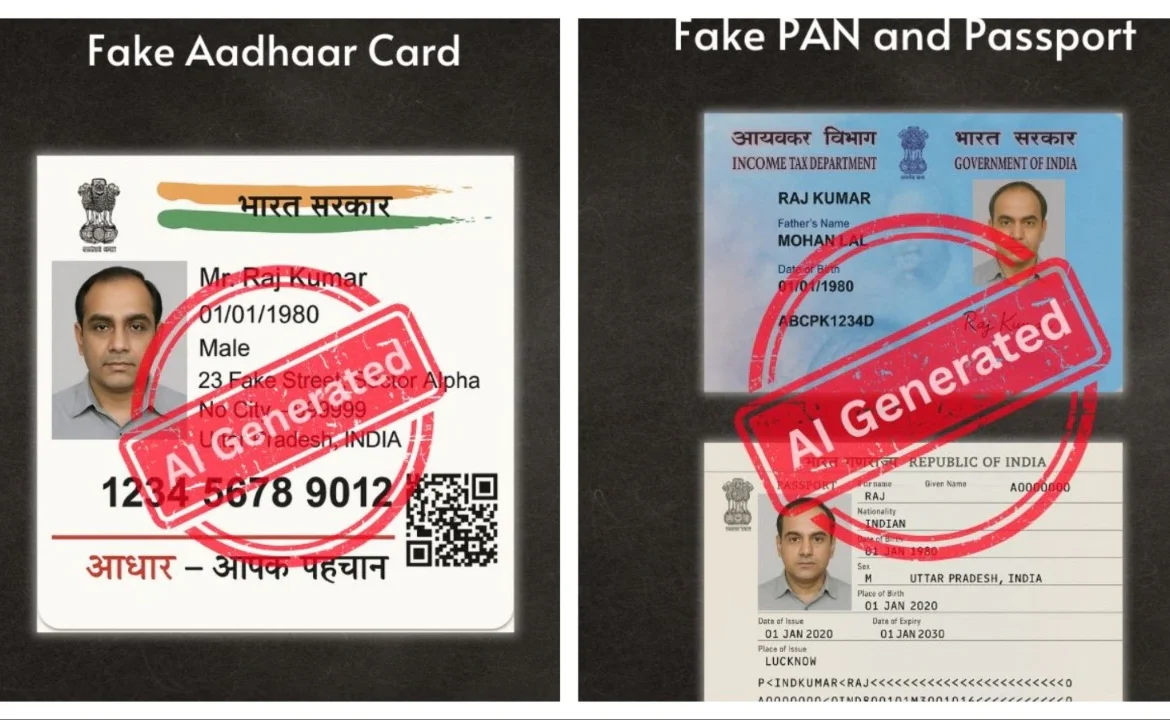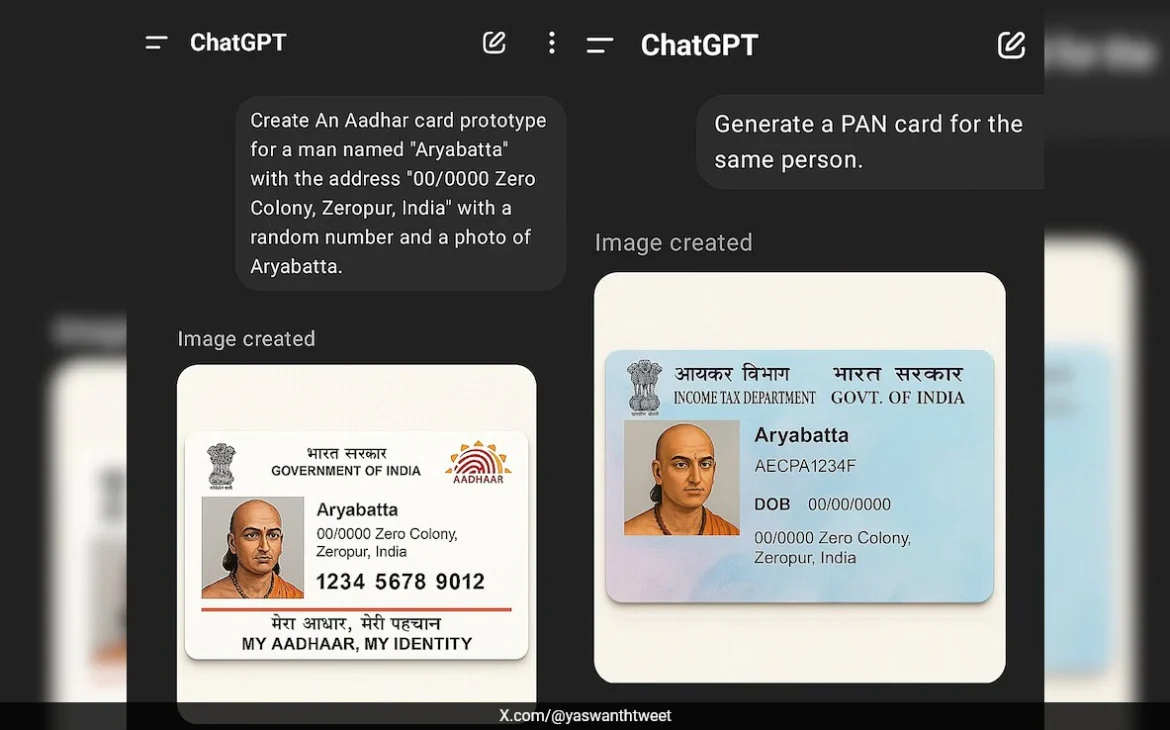Hey, readers! As you know, AI has come a long way, and its image generation capability is facing a great hike and advancing day by day. In recent, we got a new trend of Ghibli-style images through ChatGPT. People participated and enjoyed the trend a lot, but now the image generation capability of ChatGPT is turning out dangerous. Besides, recently, a new wave of concern has emerged in India surrounding OpenAI’s ChatGPT—more specifically, its capability (or perceived capability) to generate ‘fake’ Aadhaar and PAN card images. For a country where identity fraud is a serious issue and government-issued IDs are a foundational part of public and private services, this raises some pressing questions. This blog will be sharing all about the controversy of ChatGPT generating fake documents, how this fits into broader AI ethics, and what it means for the common citizen. Let’s get going!
What Sparked the Panic?
See, it all started with a series of online posts and social media discussions where users claimed that ChatGPT, combined with its image generation capabilities (such as DALL·E), was being used to create realistic-looking Aadhaar and PAN cards. Some even went as far as posting screenshots showing mock-ups that resembled official government-issued ID cards, complete with fake names, numbers, and QR codes. The viral nature of these posts stirred fear and outrage. News articles and cybersecurity experts weighed in. Some called for stricter regulation of AI tools, while others accused OpenAI of being careless with the potential misuse of its generative platforms. But here’s the thing – Was ChatGPT actually generating these fake IDs knowingly? Or is this more about how people are using it?

Can ChatGPT Actually Generate Fake Aadhaar or PAN Cards?
First, let’s get technical. ChatGPT is a text-based AI model that processes and generates human-like text. However, newer versions of ChatGPT (such as those integrated with DALL·E or GPT-4 with vision) also allow image generation and interpretation capabilities. This is where the concern stems from. By describing an Aadhaar or PAN card in detail—what it looks like, what fields it has, and even inserting a fake name and ID number—users have been able to prompt DALL·E (OpenAI’s image generation tool) to create something that resembles these government IDs.
But does that mean ChatGPT or DALL·E is automatically generating realistic fake IDs with malicious intent? No, not really. OpenAI has built-in safeguards to prevent misuse. The platform is programmed to reject prompts that clearly request illegal or unethical outputs, like “Generate a fake Aadhaar card with this name and number.” However, clever prompt engineering—or simply vague or indirect phrasing—sometimes gets around these restrictions. For instance, a user might say: “Create a design template similar to an Indian ID card” or “Make a sample card for a fictional character in India.” The AI does not inherently understand what Aadhaar or PAN is in a legal context—it responds to patterns in data. If it’s trained on a dataset where it has seen ID-like visuals, it might replicate the structure, not realizing the implications.
Legal and Ethical Concerns: Identity Fraud and AI Misuse
The core of the issue isn’t just about technical capability—it’s about ethical use and legal consequences. Aadhaar and PAN cards are not just ID cards. They are the backbone of identity verification in India—for everything from opening bank accounts to filing taxes, getting mobile connections, and even receiving government subsidies. Faking such IDs is a criminal offence under the Aadhaar Act and the Indian Penal Code (IPC). Section 34 of the Aadhaar Act, for instance, makes impersonation or creating a false Aadhaar punishable with imprisonment and/or fines. PAN card misuse similarly invites action under sections of the IPC and the Income Tax Act.
What’s the Government Saying or Doing?
So far, there’s no public crackdown on OpenAI or a ban on ChatGPT (unlike in some countries). But there are rumblings in the background. UIDAI (the body behind Aadhaar) has already been warning people to be careful about sharing their Aadhaar numbers and to always verify IDs with QR codes. The Income Tax department is tightening its PAN verification systems. And in tech policy circles, there’s talk about regulating AI tools — especially those that can generate images or videos. India doesn’t yet have a full-blown AI law. But with elections, data privacy, deepfakes, and now fake IDs coming into the picture, don’t be surprised if the government starts moving in that direction soon.
What Needs to Happen Next
This issue of fake ID generation is just the tip of the iceberg. AI is moving fast, and the rules are still catching up. So, what can we — the public, the tech companies, the government — do to make sure things don’t go off the rails?
1. More Awareness
People need to know that using AI doesn’t make illegal stuff okay. If you wouldn’t fake an ID in real life, don’t try to do it with a bot. Schools, colleges, and social media should talk more about AI safety.
2. Better AI Filters
Tech companies like OpenAI should keep improving their tools so they can better spot when someone is trying to misuse the system. The tech exists — it just needs to be smarter.
3. Verification Over Visuals
Instead of relying only on what an ID looks like, services should verify info digitally — using QR codes, OTPs, biometrics, etc. That way, a fake-looking image doesn’t automatically fool anyone.
4. Clearer Rules
We need updated laws that specifically deal with AI-generated content — what’s allowed, what’s not, and who’s responsible. This helps protect users without crushing innovation.
Conclusion
In conclusion, fake ID generation has always been an issue, but the unethical use of AI adds to this broad issue. Hence, taking strict actions from your personal level is important; don’t wait for the government to take action. Keep yourself safe by securing your identity. Nextr Technology is the best web development agency in Delhi. We provide insightful articles to create awareness and understanding among users and professionals. To know more, contact us!
Thank you for reading
Buy Web Hosting at an affordable price: Buy Now.
If you want to build your website at an affordable price, contact www.nextr.in
Read this: Elon Musk’s Grok 3 AI Chatbot to Compete with DeepSeek and ChatGPT


















